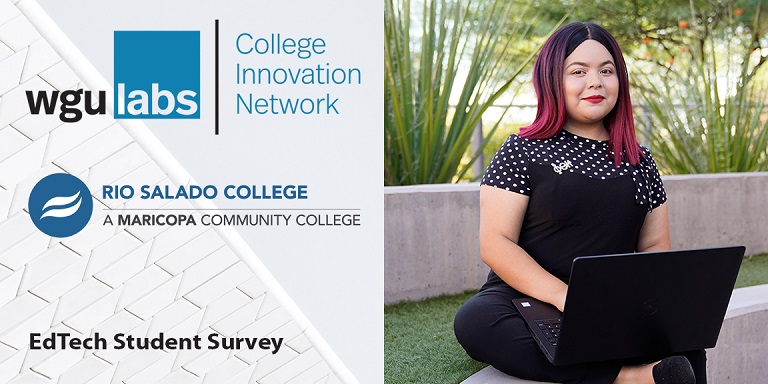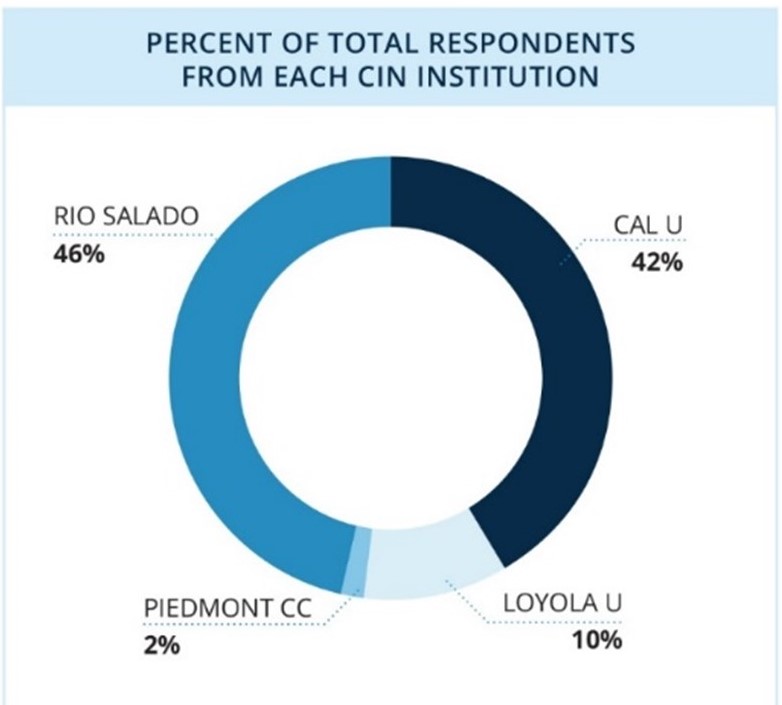Rio Salado College: New Student Survey Highlights Importance of EdTech Self-Efficacy

In August of 2020, Rio Salado College became a founding partner of the College Innovation Network (CIN), which was designed to connect leaders from colleges and universities with EdTech innovators to advance students’ academic, career, and life outcomes (Flores, 2020). In August 2021, CIN, an initiative spearheaded by WGU Labs, published the results of a multi-institution survey aimed at understanding students’ learning experiences with education technology (EdTech) during the 2020-2021 academic year.
The New Digital Divide: How EdTech Self-Efficacy is Shaping the Online Student Learning Experience in Higher Ed shares survey results from 684 students across four CIN member institutions—California University of Pennsylvania, Loyola University New Orleans, Piedmont Community College, and Rio Salado College—all of which serve diverse student populations. Results indicate that students’ confidence in their ability to learn and adapt to EdTech in the virtual classroom—or “EdTech self-efficacy,” as coined by CIN in the report—was an important predictor of how positive students’ online learning experiences were over the past year.

Participating Institutions in the 2021 CIN EdTech Survey
The survey consisted of 24 questions about students’ experiences with EdTech and online learning over the 2020–2021 academic year, and participants were from diverse backgrounds, attend diverse school types, and are at various stages of their higher education journey. Among the findings:
- Twenty percent of respondents “somewhat agree” or “strongly agree” that they have struggled to learn how to use educational technologies in online courses.
- A third of respondents “somewhat agree” or “strongly agree” that having to learn how to use new educational technologies throughout the year has been hard.
- Thirty-four percent of respondents report that most of the education technologies they used over the school year were new to them.
“There is an implicit assumption in the EdTech industry that students today are ‘digital natives’ and will quickly and easily learn to use new tech in the classroom,” said CIN research lead, Dr. Nicole Barbaro. “While this may be true for most, our survey shows that this assumption may be leaving upwards of 20 percent of college students behind, and students of color are impacted at a higher rate than their white counterparts.”
The survey report also highlights the types of EdTech students reported using most often in their online courses. Foundational EdTech hardware (i.e., laptops and tablets) and software (i.e., Microsoft Office, video conferencing, Google Suite) are driving the online learning transition in higher education, and findings from the survey show that inequitable access to foundational EdTech can create tech dependencies for new products and exacerbate inequity.
“The findings from our research demonstrate that the digital divide is more complex than only inequity of access to EdTech,” said CIN Director, Dr. Omid Fotuhi. “Rather, it is also a product of the inequities that impact whether, and how, students actually use those essential EdTech resources. This is important to understand so we can ensure all students are getting the most out of their online learning experiences.”
Some of the survey questions were designed to measure differences in how students at online institutions and traditional brick-and-mortar institutions experienced online learning in the pandemic. The results indicate a significant statistical difference between the groups, with students from online programs reporting better experiences (p < .001) with EdTech than their brick-and-mortar counterparts.
“This study underscores the fact that students must learn both technology and content to experience effective online learning,” said Janelle Elias, Vice President of Strategy and Advancement at Rio Salado College. “Introducing any new technology into the learning experience requires appropriate resources and supports to mitigate negative impacts to teaching and learning content.”
“Rio Salado is proud to serve with WGU Labs as a founding member of CIN and to share this report with League members and higher learning institutions across the country,” said Rio Salado President Kate Smith. She continued:
These findings may be instrumental in helping educational institutions make informed decisions about equity and accessibility issues. Online learning, technology and data analytics are core components of our operations. We are committed to developing innovative strategies and tools to share with League members and other educators in an effort to help track and improve student learning and outcomes.
Reference
Flores, A., (2020, November). Rio Salado College: Founding Member of College Innovation Network Helps to Guide EdTech Student Success Pilot Program. Member Spotlight. https://www.league.org/member-spotlight/rio-salado-college-founding-member-college-innovation-network-helps-guide-edtech
Lead image: Pictured here is 2020 Student Speaker Ashanti Ruiz, who is now a Rio Salado Student Success Coach for the community development department.
Opinions expressed in Member Spotlight are those of the author(s) and do not necessarily reflect those of the League for Innovation in the Community College.










